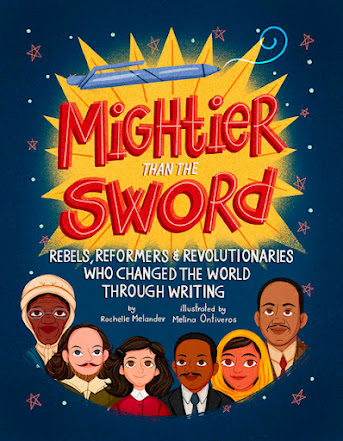Last week when I introduced Rochelle Meander's new book, Mightier than the Sword, I promised a follow-up blog by Rochelle. In this post, Rochelle takes her suggestions for students and challenges writers to try their hands (and computers!) at using a different format.
In the comments, let me know how you might change up your writing. So, without further ado...here's Rochelle.
Several years ago, the artist Jessica Hagy suggested that dangerous habits emerge at the intersection of the “tried, tired, and true.” No kidding. As a freelance writer, I’ve written dozens of profiles, hundreds of how-to blog posts, and more essays than I can count. These familiar formats come easily to me. Do they work? Yes. But are they tried and tired? Yup.
I admire writers who play with form. Jennifer Egan put a power point presentation into her novel, A Visit from the Goon Squad. Amy Krouse Rosenthal used an encyclopedia format to tell her life’s story in Encyclopedia of an Ordinary Life.
Playing with the form of your piece, even just for fun, can help you break with “tried and true” habits. Even if you don’t end up using the new format in your finished piece, the work you put in will add richness to your writing and possibly ignite your creativity.
When I invite my students to play with new formats, it has an additional benefit. Many students feel daunted by traditional formats with stringent requirements. They get stuck on the mechanics and cannot access their creativity. But introducing a format with different or fewer rules can bypass the panic and unlock their playfulness.
Here are three ways you might play with form. Use these ideas to play with your current project, create a new piece, or simply as writing practice. If you’re a teacher, each of these can be used as a mini-lesson.
Play with Poetry
The last time I taught poetry, I had to convince a seven-year-old boy that the poems he was about to hear were not just about love and other disgusting emotions. It took about seven “gross” poems to get him to believe me.
Even though I know the many uses of poetry, I tend to save it for my more emotional moments. I rarely use poems to write a profile of an artist or a how-to piece. But I should! In Infinity: Beyond the Beyond the Beyond, the mathematician Lillian R. Lieber used poetry to explain the mathematical concept of infinity. (It’s brilliant!)
Your turn: Consider your work in progress: could you write it as poetry? Or do you have an essay you might write as a poem? Japanese writers link together several haiku to tell a story. (This is called Renga—and is usually done collaboratively, with writers alternating stanzas.)
Make your Manifesto
Throughout the centuries, people have written manifestos to protest injustice, declare their rights, and announce their vision for a better future. The French playwright and political activist Olympia de Gouges wrote her manifesto to challenge inequality: Declaration of the Rights of Woman and of the Female Citizen (1791). At the Senaca Falls Convention held in 1848, Elizabeth Cady Stanton and others wrote their manifesto expressing the injustices against women and demands for equality. In recent years, people have written manifestos on creativity (How to Be Creative by Hugh McLeod) and Design (The Design Funnel by Steven Hay).
Your turn: But what about you? If you or your character could write a manifesto, what would you declare? You don’t have to write about the most serious problems in the world. You could simply write a manifesto about the dirty socks littering your floors or the horrible food in the cafeteria. What do you need to declare?
Create a Speech
Have you ever watched a TED Talk and wondered what it would be like to give a speech like that? The Rev. Dr. Martin Luther King, Jr. wrote books and letters—but he was known for delivering riveting speeches that helped people see a new and different world. The young people from Marjory Stoneman Douglas High School survived a horrific shooting then used their visibility to give speeches against gun violence.
Your turn: Take your best personal story, your favorite topic, or a cause you care about, and write a speech. You get bonus points if you create a talk that doesn’t use a power point presentation!
What next?
Oh, the fun you can have! There are so many forms you can play with—cross-examination, instructions, recipes, plays, texting, and more. Make it a part of your writing practice to try a new form each week—and see if it changes what or how you write. You might just land on a mash-up that works!
Maybe you'll try writing a rap, like Sonita Alizadeh did!
Throughout history, people have picked up their pens and wielded their word - transforming their lives, their communities, and beyond. Representing a diverse range of backgrounds and experiences, Mightier Than the Sword connects over forty inspiring biographies with life-changing writing activities and tips, showing readers just how much their own words can make a difference.
About the author: Rochelle Melander wrote her first book at seven and has published 11 books for adults. Mightier Than the Sword: Rebels, Reformers, and Revolutionaries Who Changed the World through Writing is her debut book for children. She’s a professional certified coach, an artist educator and the founder of Dream Keepers, a writing workshop for young people. She lives in Milwaukee, Wisconsin with her husband, children, and two dogs. Visit her online at writenowcoach.com or rochellemelander.com.
GIVEAWAY








1 comment:
I have been hearing a lot about this book. It looks great. Very interesting ideas to play with in this post. Thanks for that. I will pass on the giveaway since I just won a book from you. Yay!
Post a Comment